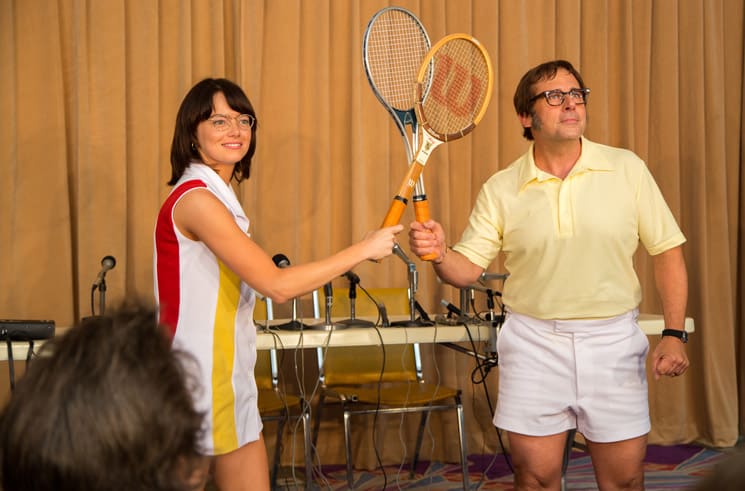It's impossible not to see Battle of the Sexes — the story of a chauvinist man with weak morals who will stop at nothing to stay in the spotlight, and the highly skilled woman who must stand up against him — as a strangely prescient parable for last year's presidential election (filming started months before America, and the rest of the world, were forced to take Trump seriously).
La La Land's Emma Stone stars as real-life tennis champ Billie Jean King, a future feminist icon struggling to make ends meet while playing the women's circuit. When former Wimbledon winner Bobby Riggs (Steve Carell) challenges her to a globally televised exhibition match meant to pit man against woman, she initially rebukes his offer. But after fellow competitor Margaret Court takes up the gauntlet and loses, King agrees to the sexist competition, fearing that ignoring him and a society desperate to see them play would set women's tennis, and the women's movement as a whole, back many years.
Directed by Little Miss Sunshine duo Jonathan Dayton and Valerie Faris, Battle of the Sexes is a stunning and stylish film with a powerful message. Former Second City alum Carell does a spot-on Riggs impression, but it's Stone who's the clear winner here as King, delivering a performance that's as tender (the fledgling affair that develops between her and Marilyn Barnett, played with aplomb by underrated actress Andrea Riseborough, beefs up the film's weaker moments) as it is tough (Stone gained over 15 pounds of muscle preparing for the role, and she's never seemed so imposing on screen).
It all culminates with a three-game match at Houston's Astrodome, and that's where much of the quirk fans of the famous music video directors (they did the Smashing Pumpkins' clip for "Tonight Tonight," among others) have come to expect comes through, as they deliver a dreamlike sequence filled with historically precise shots, volleys and the fanciful fanfare of a circus (what with the costumes, cheerleaders and marching bands that dot the perimeter). It's pretty to look at, but, like most tennis movies, doesn't really hold your attention.
Before you know it, King is the clear winner, but it barely feels satisfying. Instead, the end feels like a roadblock on the way to something bigger and more important. (That's kind of the point — King would be outed a few years later and become a LGBTQ icon). Same goes for Stone: Battle of the Sexes isn't her best or most memorable work, but — considering it was filmed a year before her Oscar win — it's a good snapshot of an artist in transition, one who's already taking on the world.
(Searchlight Pictures)La La Land's Emma Stone stars as real-life tennis champ Billie Jean King, a future feminist icon struggling to make ends meet while playing the women's circuit. When former Wimbledon winner Bobby Riggs (Steve Carell) challenges her to a globally televised exhibition match meant to pit man against woman, she initially rebukes his offer. But after fellow competitor Margaret Court takes up the gauntlet and loses, King agrees to the sexist competition, fearing that ignoring him and a society desperate to see them play would set women's tennis, and the women's movement as a whole, back many years.
Directed by Little Miss Sunshine duo Jonathan Dayton and Valerie Faris, Battle of the Sexes is a stunning and stylish film with a powerful message. Former Second City alum Carell does a spot-on Riggs impression, but it's Stone who's the clear winner here as King, delivering a performance that's as tender (the fledgling affair that develops between her and Marilyn Barnett, played with aplomb by underrated actress Andrea Riseborough, beefs up the film's weaker moments) as it is tough (Stone gained over 15 pounds of muscle preparing for the role, and she's never seemed so imposing on screen).
It all culminates with a three-game match at Houston's Astrodome, and that's where much of the quirk fans of the famous music video directors (they did the Smashing Pumpkins' clip for "Tonight Tonight," among others) have come to expect comes through, as they deliver a dreamlike sequence filled with historically precise shots, volleys and the fanciful fanfare of a circus (what with the costumes, cheerleaders and marching bands that dot the perimeter). It's pretty to look at, but, like most tennis movies, doesn't really hold your attention.
Before you know it, King is the clear winner, but it barely feels satisfying. Instead, the end feels like a roadblock on the way to something bigger and more important. (That's kind of the point — King would be outed a few years later and become a LGBTQ icon). Same goes for Stone: Battle of the Sexes isn't her best or most memorable work, but — considering it was filmed a year before her Oscar win — it's a good snapshot of an artist in transition, one who's already taking on the world.
